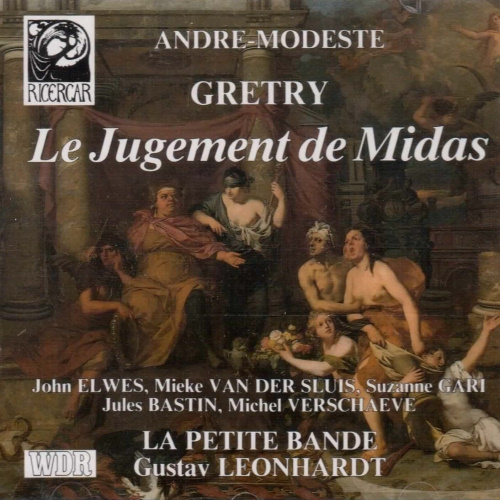 |
1 CD -
RIC 063033 - (p) 1989
|
|
LE JUGEMENT DE
MIDAS
|
|
|
|
|
|
|
|
| Andre-Modeste
GRETRY (1741-1813) |
Le
Jugement de Midas (extraits) |
|
|
|
|
-
Ouverture |
|
4' 13" |
1
|
|
- Act 1 - Scène 2: Duo de
Palémon et Apollon |
|
4' 45" |
2
|
|
- Act
2 - Scène 2: Ariette d'Apollon
|
|
2' 35" |
3 |
|
- Act
2 - Scènes 5, 6: Trio (Palémon,
Pan, Marsias) - Quatuor (Palémon,
Pan, Marsias, Mopsa)
|
|
2' 00" |
4 |
|
- Act
2 - Scène 8: Duo de Lise et
Apollon |
|
2' 47" |
5 |
|
- Act
2 - Scènes 11, 13-14: Duo (Mopsa,
Chloé) - Quatuor (Mopsa, Chloé,
Palémon, Lise) - Quintette (Chloé,
Mopsa, Lise, Pan, Marsias) |
|
5' 47" |
6 |
|
- Act
3 - Scène 4: Duo de Marsias, Pan |
|
2' 25" |
7 |
|
- Act
3 - Scène 4: Ariette d'Apollon |
|
2' 50" |
8 |
|
- Act
3 - Scène 5: Final (tous) |
|
2' 57" |
9 |
|
|
|
|
|
| John Elwes,
Ténor (Apollon et Marsias) |
CHŒUR DE LA
CHAPELLE ROYALE DE PARIS |
|
| Mieke van der
Sluis, Soprano (Chloé) |
Philippe
Herreweghe, Chef de chœurs |
|
| Françoise
Vanhecke, Soprano (Lise) |
LA PETITE
BANDE
|
|
| Suzanne Gari,
Soprano (Mopsa) |
Gustav
Leonhardt, direction |
|
| Jules Bastin,
Basse (Palémon) |
|
|
| Michel
Verschaeve, Basse (Pan) |
|
|
|
|
|
|
Luogo
e data di registrazione |
|
Liegi (Belgium) -
Settembre 1980
|
|
|
Registrazione: live
/ studio |
|
studio |
|
|
Producer |
|
-
|
|
|
Recording
|
|
Eine Aufnahme des
Westdeutschen Rundfunks
|
|
|
Prima Edizione LP |
|
-
|
|
|
Edizione CD |
|
Ricercar | RIC 063033
| 1 CD - durata 32' 01" | (p) 1989
| ADD
|
|
|
Original Cover
|
|
Gérard de Leirasse
(1640-1711), Le Tribunal de la
sottise (detail), Liège,
Musée de l'Art Wallon
|
|
|
Note |
|
-
|
|
|
|
|
La
cour a dénigré tes
chants
Dont
Paris a dit des
merveilles;
Grétry,
les oreilles des grands
Sont
sou vent de grandes
oreilles!
Voltaire was the author of
these lines, and clearly was
an admirer of Grétry’s work;
the "grandes oreilles" are
an allusion to certain
asses’ ears which appear in
the libretto of the Judgement
of Midas. Apollo is in
momentary disgrace with
Jupiter, and he is thrown
down to Earth at the height
of a storm. He is able to
mingle unnoticed with
humankind by adopting the
disguise of a shepherd, and
in this disguise and under
the name of Alexis, he comes
into contact with a peasant,
Palémon, to whom he offers
his services. Apollo is
reatly surprised later to
discover, almost as a
comfort for his pains, that
this simple rustic peasant,
who never ceases to argue
with his wife Mopsa, has two
young daughters. The
forthcoming marriages of the
two girls, Lisa and Chloé
are the latest cause for
argument; Midas, the village
magistrate has organised
these marriages in order to
keep two young men gifted
with fine voices in the
village, but the arrival of
"Alexis" has rather turned
the two girls’ heads. Midas
then organises a singing
contest to decide who shall
marry which girl. His choice
clearly falls between the
song of the woodcutter Pan,
which imitates the style of
popular vaudeville, and that
of the shepherd Marsyas
which has something of the
ornate declamatory style of
Rameau; the totally new
style of the air sung by
Apollo does not appeal to
him at all. As soon as he
has passed judgement, asses’
ears grow on his head;
Apollo reveals his true
identity, and, being unable
to choose between the two
sisters, decides to take
them both with him to
Parnassus.
This recording is devoted to
several extracts of this Comédie
mêlée d’ariettes by
GRETRY, and is taken from
recordings made by the West
Deutschen Rundfunk in
Cologne in 1980 of
performances of J .P.
RAMEAU’s Pygmalion
coupled with the Grétry
work, and given by La Petite
Bande. In order to integrate
this programme into the
Liege Festival’s "Nuits de
Septembre", which that year
featured the theme Liège
and the Occident (the
festival always presenting
works of Liégeois origin as
well as mainstream
repertory), a work by Grétry
was included in the
programme; Grétry’s critical
outlook on French operatic
style as it appears in the Judgement
of Midas was the
reason for choosing this
particular work. The release
on disc of these extracts
has long been one of
Ricercar’s projects, but one
that has often been put
aside because of the work’s
timings. The singers’,
players’ and conductor’s
work in these performances
was felt to be however
unique, and Grétry’s music
has never before sounded so
convincing. At the moment
when Grétry seems little by
little to be coming back
into fashion, this recording
will certainly reveal
Grétry’s originality and
genius, and his music surely
must be performed by
musicians who have an
enthusiasm for the music and
a care for its correct
performance in order to
seduce our ears anew. It is
to the rediscovery of this
Liège-born composer that
this release of the Judgement
of Midas is dedicated,
in hoping that the ears of
20th century listeners will
not be as asses’ ears, but
rather as those of the
people of Paris.
Jérôme
LEJEUNE
Translation:
Peter LOCKWOOD
|
  |
|
|